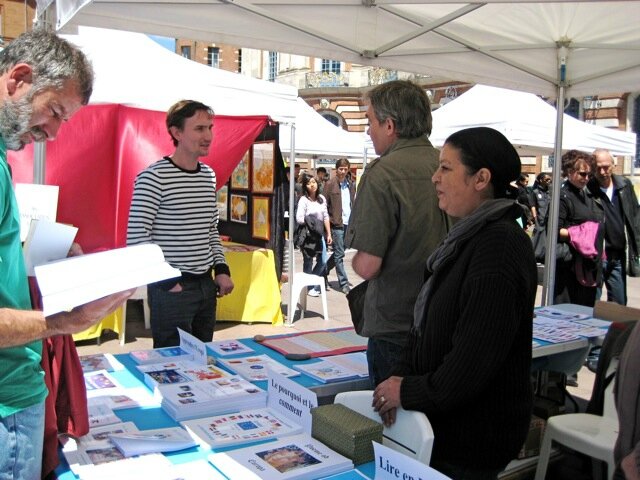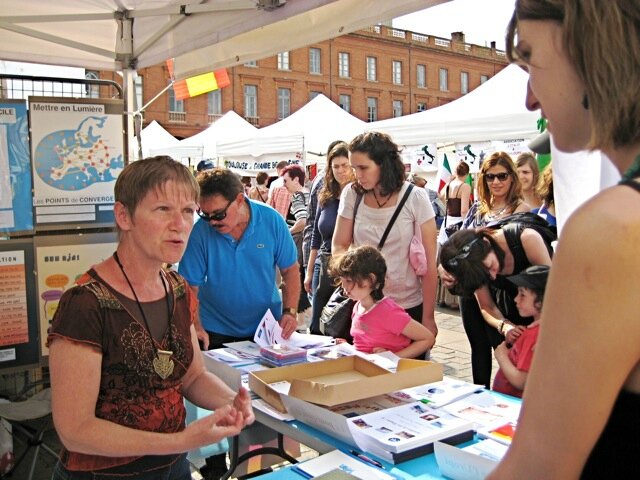Forom des Langues de Toulouse 2014 - Tuluzi Forum Lingus - Toulouse Language Forum
★ ★ ★
★ ★ ★
Forum de lingus Moldi in Tulùz
★ ★ ★
Be Soldia 18i Maj, po de pini jar nu ve partinemo in de Forum de Lingus Moldi in Tulùz su Plaz de Kapitoli. Di jar je ve sto jok maj stande: 110, prostalan nerim tale Europan lingas, ba os mole lingas od Azia wim Hindi o Vietnami, Cini, Japoni, Thaj, Tibeti, od Afrika wim Bambara, Swahili, Wolof, Malinke, Hausa, de Beti lingas od Kamerùn, Indian lingas od Amerika wim Aimara, Ketcua, Maputce o Tsotsil, klasiki id dialekti Arabi, Turki, Persi, Kurdi, Oseani lingas id os veti lingas wim Aramèi… Asiri, AsiroBabiloni, i.s.p…
Eke stande ve diko vo Arabi id Persi kaligrafij o kim traso Cini o Japoni ideograme, o usklaro vo kim vidì formen Midimari alfabete: Egiptan, Feniki, Hebràj, Greci, Latini, i.s.p…
In mole stande, ba os su de skenia id su de Oksitani Kros bemìd de Plazi, vari kulturi prostalade ve avo sta: muzik, kore, danse, marioneti teatra, Marsi arte, lisad poèmis, i.s.p…
Be posmidià, u debàt ve vido organizen, priseden pa Claude Sicre ki Alain Rey, u famos Franci linguìst id vordariskrivor we kovarkì a de publizad de vordaris Robert, id we skrivì, intra altene De Històri Vordar de Franci Lingu, id ki Christiane Marchello-Nizia, u linguista id spesialista Midievi Franci, we skrivì u Històr de Franci Lingu.
Is usfalim vu se in de Tuluzi regiòn, vaizan o doman za, vene vizito de Forum de Lingus Moldi; nu ve so mol felic procepo va be de Uropi stand.
★ ★ ★
Forum des langues de Toulouse
★ ★ ★
Dimanche 18 mai, pour la 5e année consécutive, nous participerons au Forum des Langues de Toulouse sur la Place du Capitole. Cette année, nous atteignons les 110 stands, qui présenteront la quasi-totalité des langues européennes, mais aussi de nombreuses langues d'Asie comme le hindi ou le vietnamien, le chinois, le japonais, le thaï, le tibétain, d'Afrique comme le bambara, le swahili, le wolof, le malinké, le haoussa, les langues beti du Cameroun, des langues indiennes d'Amérique comme le quechua, l'aymara, le mapuche ou le tsotsil, l'arabe classique et dialectal, le turc, le perse, le kurde, des langues d'Océanie et également des langues anciennes comme l'araméen, l'assyrien, l'assyro-babylonien, etc…
Certains stands vous initieront à la calligraphie arabe et persane, aux idéogrammes chinois ou japonais; on vous expliquera l'origine des alphabets méditerranéens: egyptien, phénicien, hébreu, grec, latin, …
Sur de nombreux stands, mais aussi sur la scène et sur la Croix occitane au centre de la place, se dérouleront diverses manifestations culturelles: musique, chorales, danses, théâtre de marionnettes, arts martiaux, lectures de poèmes…
L'après-midi sera organisé un débat, sous la présidence de Claude Sicre, avec Alain Rey, célèbre linguiste et lexicographe français qui a collaboré depuis 1952 à la publication des dictionnaires Robert, et a rédigé entre autres le Dictionnaire historique de la Langue Française, et également avec Christiane Marchello-Nizia, linguiste et spécialiste du français médiéval, qui a publié une Histoire de la Langue Française.
Si vous vous trouvez dans la région de Toulouse que vous habitez ou que vous visitez, venez voir le Forum des Langues du Monde. Nous serons très heureux de vous accueillir au stand Uropi.
★ ★ ★
Be de Uropi stand, 2013
★ ★ ★
World Languages Forum in Toulouse
★ ★ ★
On Sunday May 18th, for the fifth time, we'll be taking part in The World Languages Forum on Capitol Square in Toulouse. This year there will be as many as 110 stands presenting nearly all European languages as well as many Asian languages like Hindi or Vietnamese, Chinese, Japanese, Thai, Tibetan, African languages like Bambara, Swahili, Wolof, Malinke, Hausa and Indian languages of America like Quechua, Aymara, Mapuche or Tzotzil, classical Arabic and various dialects, Turkish, Persian, Kurdish and languages of Oceania as well as ancient languages like Assyrian and Assyro-Babylonian, etc.
On certain stands you will be initiated to Arabic, Persian, Chinese or Japanese calligraphy, or you will be explained the origin of Mediterranean alphabets: Egyptian, Phoenician, Hebrew, Greek, Latin, and so on.
On Many stands and also on the stage and on the Occitan Cross in the middle of the square, cultural activities will take place: music, choirs, dances, puppet theatre, martial arts, poetry reading…
In the afternoon there will be a debate moderated by Claude Sicre, with Alain Rey, a famous French linguist and lexicographer who has been collaborating in the publishing of Robert dictionaries since 1952 (among other things he published the Historical Dictionary of the French Language), and also with Christiane Marchello-Nizia, a linguist ans a specialist of medieval French, who published a History of the French Language.
If you happen to be living or travelling in the Toulouse area, come and visit the World Languages Forum; we will be delighted to welcome you at the Uropi stand.
★ ★ ★
Be de Uropi stand, 2012
★ ★ ★


/https%3A%2F%2Fprofilepics.canalblog.com%2Fprofilepics%2F2%2F7%2F277026.jpg)






/http%3A%2F%2Fstorage.canalblog.com%2F34%2F05%2F321345%2F104734977_o.jpg)
/http%3A%2F%2Fstorage.canalblog.com%2F40%2F19%2F321345%2F83998905_o.jpg)
/http%3A%2F%2Fstorage.canalblog.com%2F95%2F78%2F0%2F37613244_o.jpg)
/http%3A%2F%2Fstorage.canalblog.com%2F36%2F94%2F321345%2F132766014_o.jpeg)